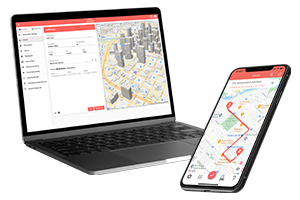Last updated on: January 2, 2023
The goal of our new Case Study series is to educate our users about some common tax-related topics. We wanted to start with the not-so-fortunate cases. So that we can move on to the good practices later to show how much easier it is to claim a tax deduction by keeping and/or retrospectively reconstructing a mileage log with IRS-proof mileage log software.
In the first Case Study, we examined what happens when you claim deductions but don’t have mileage logs to support them.
Then, in the second Case Study, we examined what happens if you keep a mileage log, but round off the numbers and work with approximate distance calculations.
In the third Case Study, we took a look at what happens if you record your data real time in good faith, but don’t know exactly what data you should record.
These were individual cases. The nature of the mistakes wasn’t in relation to the matter of the subjects being employees. Mostly because they were small business owners or were self-employed.
But what mistakes can be done by a big organization?
Case Study #4: Employee mileage reimbursement programs gone wrong

Discovering company-approved inappropriate mileage expenses is a big risk during an IRS Audit both for an organization and for their employees. However, organizations of all sizes commit similar errors on numerous occasions with mileage reimbursement.
Problems start with not having a company policy about mileage reimbursement. If details are unclear about what constitutes business mileage it can lead to the abuse of the mileage reimbursement system. Without the willful malevolence of any side (i.e. management or employees). Often the company itself is unsure about what constitutes a business mileage or what kind of mileage is reimbursable at all. In one particularly extreme case, the company wasn’t even asking for mileage logs from their employees to prove business mileage claims.
If incorrect reimbursement is paid because the company has not communicated properly after what mileage can reimbursement be claimed, the company and the employees as well can face penalization from the IRS.
A good company policy should consist of what to record, with what frequency with what device for the best results. The IRS has strict rules about how a mileage log should look like.
Paper mileage logbooks as company records
Companies often struggle with the task of administrating the mileage logs of their employees. A lot of organizations still depend on manual mileage logging. As this is unbearably time-consuming for the employees and puts a huge amount of administrative burden on the administrative staff, numerous organizations are eager to repay with no standard documentation. This puts your business in danger of making erroneous repayments, in this way throwing money out of the window.
As a leader, if your business depends on manual mileage logs or spreadsheets, you are tolerating records that could be doctored in the representative’s favor. You’re likewise troubling your employees with the assignment of manually logging each and every business drive.
Rather, improve workers’ efficiency and give them smarter devices to computerize mileage log documentation. So your staff can do what they excel at.
MileageWise for Teams
MileageWise’s user management allows multiple users to work on a single interface. User management is also a solution if you want to share your dashboard with your accountant or colleagues. As work can be more efficient this way. For example, your colleagues record their mileage logs. Your accountant summarizes and prints them out at the end of the month.
The Built-In IRS Auditor checks and corrects 70 logical conflicts, so your recommended mileage log will be IRS-proof and meet the expectations, without a doubt.
With these innovative developments, mileage logging is a child’s play. There’s no need to worry about running the administration anymore. Everybody can overcome this frightening obstacle and make their car-related business cost management economical!
Try MileageWise without obligation! The trial period is 30 days with full features. No credit card needed.



